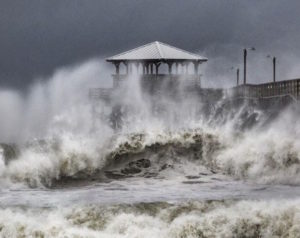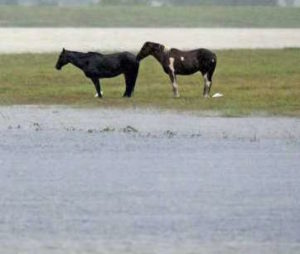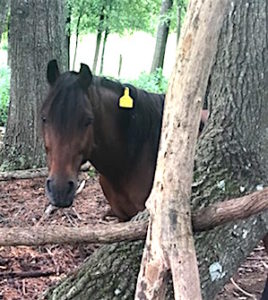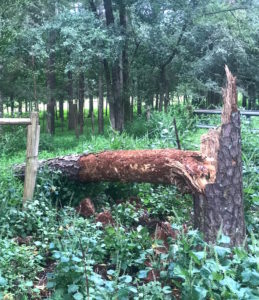 Editor’s Note: Amy Skinner is a regular guest columnist and has been a horse gal since age six. She will present an arena demonstration with fellow trainer and rider, Katrin Silva, at the Best Horse Practices Summit.
Editor’s Note: Amy Skinner is a regular guest columnist and has been a horse gal since age six. She will present an arena demonstration with fellow trainer and rider, Katrin Silva, at the Best Horse Practices Summit.
She rides and teaches dressage and Western. Skinner has studied at the Royal Andalusian School of Equestrian Art in Spain, with Buck Brannaman, Leslie Desmond, Brent Graef, and many others.
Skinner lives in North Carolina where she and her horses successfully weathered the recent storm activity.
Read about Wildfire preparations and Need-to-Know’s
Read our Disaster Tips for Horse Owners
Amy Skinner writes:
Prior to Hurricane Florence’s arrival, a mandatory evacuation was issued for many communities on the North Carolina coast. The news predicted a catastrophic storm with high winds and flooding.
For several days, I offered transportation to those seeking to move their horses further inland and out of harm’s way. On the drive from evacuation areas, I came back with only one horse in my trailer. My offer of help was rejected or thwarted because, in one way or another, owners had not trained their horses for life’s uncertainties.
 But here’s the thing: Uncertainties are Certain.
But here’s the thing: Uncertainties are Certain.
Many folks had not moved their horses off their properties in years. Some horses were used to a very set routine and became extremely nervous with hurricane accommodations (for many, a pen or stall was all that was available).
- One mare colicked when moved.
- Another horse’s owner rejected my offer for a ride, saying her horse would not load in my stock trailer because she was only used to slant load trailer.
- Another would not move her horse because all that was available was pasture with cows.
- Another said her horse could not ride in a trailer with other horses.

Abandoned horses on flooded grounds
Unfortunately, with time pressing before the storm, I left these folks behind. The storm was not good to the coast. A week after the storm, many of those roads are still flooded or inaccessible, making evacuation impossible. I fear many horses are now standing in floodwaters, at risk of drowning, disease, and death.
Lack of preparation and inability to create an adjustable horse undoubtedly resulted in tragic consequences. My heart aches for the animals left behind to suffer and die.
Check out these handy ID tags.
The storm offers a sad, yet important, lesson in preparedness:
You aren’t doing your horses any favors by keeping their worlds small. If your horse can’t adjust to new sights, routines, and scenarios, their likelihood of surviving and simply staying healthy through an event like Florence is lowered dramatically.

One of Skinner’s horses, tagged with vital info
In times of emergency, you cannot afford to be picky and you cannot afford to delay. You need to be able to catch, load, and transport your horse quickly. At the very least, horses need to be able to tolerate different sights, sounds, experiences, and accommodations.
I make sure to load and transport my horses frequently, even for short trips. During the hurricane, a large tree fell and took down a section of my fence. In minutes, my horses were haltered, loaded, and moved to the neighbors. To them, it was nothing new. My neighbor joked they were just having a “slumber party,” as we unloaded four horses in the pouring rain.
Wild horses roam miles a day, but domestic horses are often confined to small areas. Some go from stall, to pen, to arena their entire lives. Their world becomes very small, and it doesn’t take much to upset their systems.
It pays to build confidence with adjustability:
- Taking your horse to new environments,
- Learning new things
- Riding on different footing
- Feeding at different times
These steps not only help you be with your horse and ride more safely, it could save their lives in an emergency.
If you are working hard now to keep your horses routine “just so” in order to prevent stress and colic, stop and ask yourself:

This tree meant Skinner’s horses had to be moved to unfamiliar pasture
What will they feel like when you can’t control that routine?
If you just haven’t gotten around to taking the time to expose them, are you ok with leaving your horses behind, because they haven’t been in a trailer in a decade and you cannot load them?
Do your horses a favor, help them be mentally and physically adjustable enough to tackle whatever comes their way. Mentally-adjustable horses are equipped to survive.
Thanks for the article, Amy, and the insight to the downfall of not being prepared for an emergency evacuation. I really don’t think about it too much because here in Maine, our only “major” weather issue is snow/ice and we don’t need to evacuate for that. BUT, my horses are all easy to catch, halter, and load if ever there is a need. I wonder if any of those folks that refused to evacuate their horses for whatever reason will now work with their horses to make it happen for the next time (if their horse survived the floodwaters).
Great article! Thank you, Amy. I board my horse and take her off the property almost weekly. I try to expose her to as many new things as possible, because they are new to me, too! I think when people say their horses can’t do something, it really means the human is too fearful or not knowledgeable enough to go outside his/her comfort zone. Having a horse has stretched me so much – I am grateful to her every day!
Good advice. As a member of the Agua Dulce Disaster Planning committee, I invite you to go to addisasterplanning.com, Resource, Handbook. You’ll find some other good tips there. For ID we have used livestock crayons to write our phone numbers on our horses’ rumps, or nail polish to put ID info on their hooves.
EXCELLENT article, Amy! Really terrific, helpful suggestions. In perusing your tip list, I noticed that http://www.fleetofangels.org/ was not on it. In case you’re not familiar with this voluminous network of members/volunteers, they’re worth checking out. They’ve performed magnificent transportation/evacuation/rescue work for at-risk equines for years. Website has a national “transportation finder”. Fleet of Angels was created and is still managed by Elaine Nash, who was honored by ASPCA with the first ever ASPCA Equine Welfare Award just recently. Thanks and looking forward to seeing you at BHPS!
On the TLAER study group we talk about preparedness regularly. This horse trainer and educator has a similar interest and a great way to say it “PRACTICE” to prepare. For ANYTHING.
It is unconscionable to me for owners to turn down a chance to evacuate because their horses won’t load or can’t accept change.
Thank you.
Your article is golden. Whether for an emergency evacuation, but especially in one, every equine should willingly load into a trailer and be content during the trip. Sadly, your experiences with owners who have been never made the effort to get their animals exposed to trailering, much less handling by anyone other than themselves, waste valuable time for rescuers who are usually overwhelmed with last minute calls to get them out. Out here in the western states fire is the biggest threat and each year countless numbers of equines are lost. While not all can ever be saved in some of them, many more could be with some basic advanced preparation. Sadly, the same people who aren’t are the same people who usually don’t get the message until it’s too late. Perhaps we should all be making an effort to share the knowledge with casual horse owners in our communities before the next disaster hits.